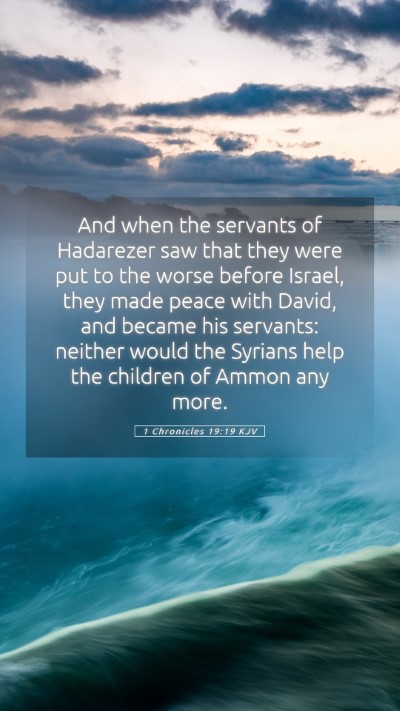Understanding 1 Chronicles 19:19: A Comprehensive Analysis
1 Chronicles 19:19 states: "But when the servants of Hadadezer saw that they were defeated by Israel, they made peace with David and became his servants. So the Syrians were not willing to help the people of Ammon anymore."
Bible Verse Explanation
This passage illustrates a significant moment of transition where the defeated Syrians acknowledge their loss and opt for peace with David, king of Israel. It highlights the themes of conflict, reconciliation, and the dynamics of power.
Contextual Background
To fully grasp the essence of this verse, it is essential to consider its historical context. The conflict arises during the reign of David, where he faced various adversaries, including the Ammonites and their allies, the Syrians. This context sets the stage for understanding the implications of defeat and the subsequent shift in alliances.
Insights from Commentaries
-
Matthew Henry's Commentary:
Matthew Henry emphasizes the idea that even in defeat, there is a potential for reconciliation. The Syrians' choice to make peace reflects a moment of wisdom in recognizing their inability to stand against Israel. This act shows God's favor towards David, affirming his leadership and authority.
-
Albert Barnes' Notes:
Barnes discusses the implications of this passage in relation to the broader narrative of Israel's military successes. He notes that the defeat of the Syrians served as a pivotal event that reshaped regional power dynamics and led to the expansion of David's kingdom. The willingness of the Syrians to become vassals signifies their acknowledgment of Israel’s supremacy.
-
Adam Clarke's Commentary:
Clarke provides a detailed historical analysis, suggesting that the defeat of Hadadezer's forces signaled a turning point in the conflict between the nations. His commentary reflects on the motivations behind the Syrians' decision to align with David, pointing to a desire for stability and the avoidance of further conflict.
Theological Themes
This verse highlights several theological themes, including:
- Divine Providence: The outcome of battles and alliances serves as a reminder of God's sovereignty over nations.
- Repentance and Reconciliation: The act of making peace demonstrates a crucial lesson in humility and the quest for harmony rather than persistent strife.
- Power Dynamics: The shift in alliances underscores the fluid nature of power and the importance of strategic relationships in biblical narratives.
Practical Application
For contemporary readers, this verse offers meaningful reflections on how to handle defeat and rivalry:
- Embrace Reconciliation: Like the Syrians, sometimes it is wise to seek peace in difficult situations rather than escalate conflict.
- Recognize Authority: Understanding and acknowledging rightful authority can lead to more stable relationships, whether in personal, professional, or communal life.
- Trust in God's Plan: Even in moments of defeat, faith can guide individuals to see the broader picture shaped by divine purpose.
Cross References
This verse connects to several other biblical passages that enrich its understanding:
- 2 Samuel 10:15-19: A parallel account discussing the same military engagement.
- Psalm 20:7: A reflection on trust in God over earthly power.
- Isaiah 9:4: A prophetic insight into the deliverance and authority of God's chosen leaders.
Conclusion
In conclusion, 1 Chronicles 19:19 is more than a historical recount; it offers profound insights into the themes of conflict resolution and divine sovereignty. By analyzing this verse through various commentaries, readers can glean deeper understanding and apply its lessons to both personal challenges and broader societal issues.
This analysis serves as a resource for those engaged in Bible study insights, providing a framework for understanding Scripture as it relates to contemporary life.


